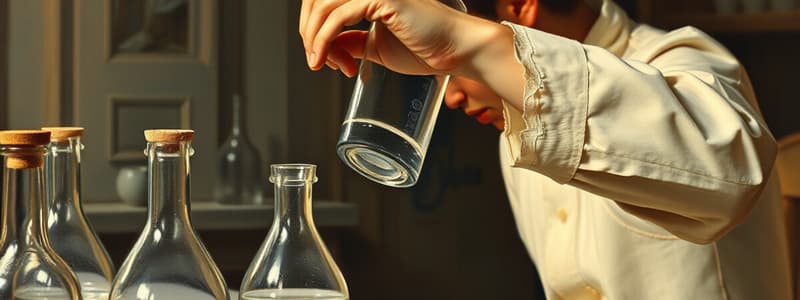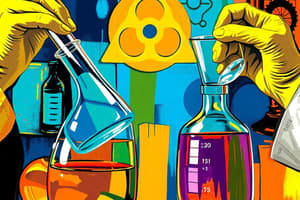Podcast
Questions and Answers
What is the safest practice when handling flammable liquids in a laboratory?
What is the safest practice when handling flammable liquids in a laboratory?
- Use a pan to contain spills when handling flammable liquids. (correct)
- Dispense flammable liquids near an open flame to minimize spills.
- Heat flammable liquids while being transported.
- Store flammable liquids in open containers.
When transporting acids in the laboratory, one should:
When transporting acids in the laboratory, one should:
- Carry them in open containers for easy access.
- Allow other chemicals to interact freely with them.
- Ensure they are secured to prevent spills. (correct)
- Transport them quickly without any precautions.
What must one always do while using a gas burner?
What must one always do while using a gas burner?
- Follow the teacher's instructions for lighting the burner. (correct)
- Light the gas burner whenever desired.
- Leave the burner unattended if nothing is heating.
- Place flammable materials close to the burner for convenience.
What should you do if a burner is lit?
What should you do if a burner is lit?
Which of the following actions is inappropriate in a laboratory setting?
Which of the following actions is inappropriate in a laboratory setting?
What is the best way to prevent spills when cleaning up hazardous materials?
What is the best way to prevent spills when cleaning up hazardous materials?
How should glassware be handled in a lab when not in use?
How should glassware be handled in a lab when not in use?
What consequence may arise from unsafe conduct in the laboratory?
What consequence may arise from unsafe conduct in the laboratory?
What precaution should be taken when inserting glass tubing into a rubber stopper?
What precaution should be taken when inserting glass tubing into a rubber stopper?
What should be done if glassware becomes 'frozen' in a stopper?
What should be done if glassware becomes 'frozen' in a stopper?
Which of the following is a key safety rule regarding hot apparatus?
Which of the following is a key safety rule regarding hot apparatus?
Why should hands be protected when inserting or removing glass tubing?
Why should hands be protected when inserting or removing glass tubing?
What is the proper way to determine if an object is hot?
What is the proper way to determine if an object is hot?
Which of the following practices is important when working with chemicals in the lab?
Which of the following practices is important when working with chemicals in the lab?
What is the importance of signing a contract before performing laboratory activities?
What is the importance of signing a contract before performing laboratory activities?
What material should be used to place hot apparatus on?
What material should be used to place hot apparatus on?
What is the safest way to transport long pieces of glass tubing?
What is the safest way to transport long pieces of glass tubing?
How should broken glass be cleaned up safely?
How should broken glass be cleaned up safely?
What should you do when heating liquids in test tubes?
What should you do when heating liquids in test tubes?
Why should heated metals and glass be handled with care?
Why should heated metals and glass be handled with care?
What equipment should be used when picking up hot glassware?
What equipment should be used when picking up hot glassware?
When should the burner or hot plate be turned off?
When should the burner or hot plate be turned off?
Where should broken glass waste be disposed of?
Where should broken glass waste be disposed of?
Why is it important to maintain a safe science classroom environment?
Why is it important to maintain a safe science classroom environment?
Flashcards are hidden until you start studying
Study Notes
Handling Glassware and Equipment Safety
- Always carry glass tubing vertically to prevent breakage and injury.
- Use a brush and dustpan, not bare hands, to handle broken glass; dispose of it in designated containers.
- When heating test tubes, never point the open end at yourself or others.
- Maintain a safe distance from flames when handling flammable liquids; always do this over a pan to contain spills.
Heating and Cooling Procedures
- Do not leave a lit burner unattended; keep items being heated under constant supervision.
- Heated metals and glass can remain hot for a long time; allow them to cool before handling.
- Use tongs or heat-protective gloves for managing hot apparatus to prevent burns.
Chemical Handling and Transport
- Never remove chemicals from the lab area; always transport acids and other chemicals with care.
- Insert and remove glass tubing from rubber stoppers with lubrication to avoid accidents.
Safe Laboratory Practices
- Never look directly into a container being heated or reacting; always follow the instructor’s instructions.
- Hot apparatus should not be placed directly on lab desks; use insulating pads to prevent damage.
Safety Instruction Compliance
- Students must follow all oral and written safety instructions provided by instructors.
- A signed safety contract by both student and parent/guardian is required before engaging in lab activities. Violations could lead to removal from the lab, detention, or failing grades.
Studying That Suits You
Use AI to generate personalized quizzes and flashcards to suit your learning preferences.





